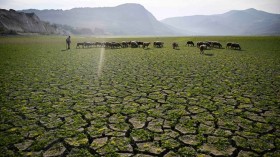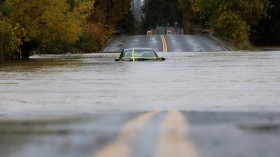Arctic temperatures just reached 100.4° F, which is the hottest reading so far recorded in history, taken in Siberia 70 miles north from the Arctic Circle. There is no question now that the world is in a state of climate emergency.
The temperature was taken at a small town in Siberia north from the Arctic Circle, and the record-breaking 100.4 degrees F that registered last Saturday is something that has not been experienced in the region since records started to be kept in the year 1885.
Bill McKibben, a co-founder of 350.org and activist, environmentalist, and author, said that it scares him. He made the remark as a response to the news about the record reading taken from Verkhoyansk, a town whose average top ambient temperature last June was 68°F.
Andrew Freedman, the Washington Post climate reporter, noted last Sunday that once a confirmatory report of the reading is acquired, this will be the 100-degree reading in the most northern part of the globe, the Arctic's highest recorded temperature reading, in a place that has been getting warmer at a rate that is double than that of the rest of the planet.
Washington Post reported that in the same area, a high temperature registering at 95.3º F or 35.2º C was recorded, which shows that the reading on Saturday wasn't unusual. Even if there is some doubt about the reading's accuracy in the town of Verkhoyansk, the temperature data recorded last Saturday from a weather balloon in the same location is supportive of the high reading. In the lower part of the atmosphere at an altitude of roughly 5,000 feet, temperatures have been unusually warm, with a reading of 70º F or 21º C. This is indicative of extreme surface heat.
Last Sunday, the World Meteorological Organization declared in a tweet that it is accepting the recorded observation - at least preliminarily - as a new world extreme, even as the organization conducts a more thorough investigation of the temperature recorded in Verkhoyansk.
Eric Holthaus, a meteorologist, tweeted that a reading of 100° F in a place 70 miles above the Arctic Circle in Siberia is a historical first. He said that it means we are indeed in a "climate emergency."
This reading was recorded within a time when a prolonged Siberian heatwave is alarming activists and climate scientists.
Charlie Gardner, a conservationist, and climate activist, has been monitoring and observing the heatwave in Siberia and says that we are already experiencing what was once expected to occur only as a worst-case scenario no earlier than 2100. He describes it as "beyond terrifying."
According to the Guardian, these freak Siberian temperatures were previously linked to a major oil spill, a plague involving tree-eating moths, and wildfires. Its report indicated that Russian towns that are located within the Arctic Circle recorded such extraordinarily high temperatures, such as Nizhnyaya Pesha, a town in Russia's northwest fringes, which has reached 30° C last June 9. The rural town of Khatanga, whose usual daytime temperature of roughly 0°C during this time, now has 25°C last May 22. Its previous record reached 12° C.
© 2024 NatureWorldNews.com All rights reserved. Do not reproduce without permission.






